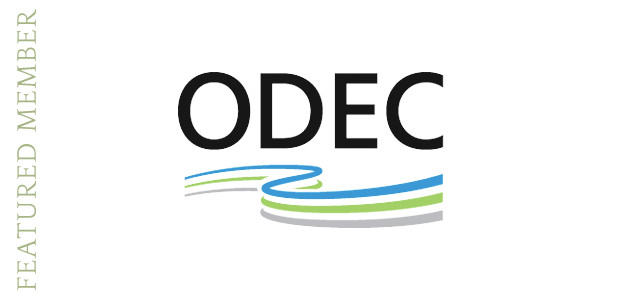
At Old Dominion Electric Cooperative, we are always exploring and evaluating new ways to operate in harmony with the environment. ODEC’s energy innovation initiatives are promoted under the slogan “We Put All of Our Energy into Energy” to outline our commitment to conserving energy.
VAEEC is pleased to spotlight the companies, organizations, utilities and municipalities it works with to advance energy efficiency in Virginia.
September 2012: Rappahannock Electric Cooperative
http://www.myrec.coop
Rappahannock Electric Cooperative (REC) delivers electricity to over 155,000 connections throughout portions of 22 counties in Virginia. As an industry leader, REC brings innovative technology, programs and services to its members, allowing them to easily incorporate and adopt energy efficiency initiatives into their daily routines.

In what ways does your company promote or service energy efficiency in your programs?
As a not-for-profit electric utility, REC focuses on providing its members with solutions they can rely on to improve their quality of life and the comfort of their home. REC works directly with its members through education programs (like the Together We Save campaign) and initiatives (such as its new Home Performance with ENERGY STAR pilot program) that focus on energy efficiency. As an industry leader, REC has been offering members the opportunity to participate in demand response programs since 1978, when it launched its water heater load management program. As a provider of both water heater and air conditioning load management programs, REC members are able to voluntarily contribute to Co-op wide load reduction.
How do you describe the value of energy efficiency to your customers and members?
REC recognizes that energy efficiency is the key to managing energy usage and lowering energy bills, and serves as a primary supplement to new generation resources. Through consistent and comprehensive programs, services and communications about little changes adding up to big energy savings, REC is making its members, and the communities it serves, contributors to efforts to ensure electricity remains reliable and affordable.
What innovations or trends do you expect to see in the near future?
Awareness and availability of information are crucial elements for REC’s members as the Cooperative strives to empower them to take advantage of energy efficiency services and energy management. With evolving tools and resources, REC expects to offer advanced technology, enabling members to better understand how they are using electricity, when they are using electricity and how to make adjustments to meet their desired expense goals. These efforts will allow members to make lasting changes to their lifestyles, and to make effective decisions about how they are using devices and equipment within their homes and about where their dollars go. As energy policies are formed at the local, state and national levels, members will likely begin to see increased opportunities to utilize renewable energy within their power grid.
What do you hope to accomplish as part of the VAEEC?
REC wants to position itself as an industry leader in energy efficiency and to help guide statewide initiatives already in place or ones that will be developed in the future. The Cooperative is looking out for the best interests of its members, while working with other organizations and companies to develop consistent statewide messages, programs and services that benefit all consumers in Virginia. With a 75-year history, REC’s experience, knowledgeable team of employees, and nationwide network of electric cooperatives, REC aims to assist the state in becoming a model for energy efficiency.
2012 General Assembly
The General Assembly convened on January 11, 2012 for a 60-day long session. It adjourned Sine Die on March 11th, but went immediately into Special Session to further discuss the budget. The General Assembly will reconvene on April 18th for “Veto Session.” Below are highlights from the Session.
Bills that passed:
- Energy Efficiency Programs (SB 493 Watkinsand HB 894 L. Ware) – Mandates that the State Corporation Commission (SCC) shall not use only one cost-benefit test when conducting approvals of demand-side management programs for both electric and gas utilities. All four tests (RIM, TRC, Utility and Participant) shall be evaluated. This bill affects those applications filed after March 8th.
- Natural Gas Infrastructure Expansion for Economic Development (HB 559 D. Marshall and SB 511 Wagner) – Allows natural gas utilities to expand infrastructure as necessary to provide natural gas to economic development projects where it is not already available and when a project developer commits to at least a five-year contract for natural gas use.
- Improved Regulatory Approval Process for Electric Transmission (HB 587 Merricks and SB 418 Stanley) – Authorizes a utility to seek approval for a 138kv transmission line from either the State Corporation Commission or the locality or localities in which the transmission line will be located. These transmission lines are frequently used for economic development projects.
- Enable Research and Development for Renewable Energy (HB 1102 J. Miller and SB 413 Norment)- Encourages investment in renewable energy research and development by providing renewable energy certificates to utilities for investment in research projects to advance renewable energy technologies. The proposal will allow a utility to meet no more than 20 percent of its annual voluntary renewable energy goal with investments in such research and development projects. The awarded certificates will be based on the amount of the investment divided by the average price of a Tier 1 and Tier 2 renewable energy certificate in PJM, the regional transmission organization of which Virginia’s electric utilities are members, for the previous year.
- High Performance Buildings Act (HB 1167 Jones, SB 160 Petersen) – Requires executive branch agencies and institutions entering the design phase for the construction of a new building greater than 5,000 gross square feet in size, or renovating such a building where the cost of renovation exceeds 50 percent of the value of the building, to conform to Virginia Energy Conservation and Environmental Standards developed by the Department of General Services considering the U.S. Green Building Council (LEED) green building rating and other appropriate requirements.
Failed to pass:
- Federal residential energy efficiency standards (HB 27 R. Marshall) – Exempts any residential building from the application of federal legislation relating to residential energy efficiency standards if such building complies with the Statewide Uniform Building Code. Except to the extent required by the Statewide Uniform Building Code, the owner of such a building shall not be required by the federal government to (i) have an energy efficiency analysis conducted on his residence, (ii) have his residence meet federal energy efficiency standards, (iii) participate in a building performance labeling program, (iv) make modifications to the residence in accordance with federal legislation, or (v) post a label showing the energy efficiency of his home prior to its sale. Failed to pass Senate Commerce and Labor Committee.
- Renewable energy portfolio standard (HB 69 Englin) – Requires each investor-owned electric utility and distribution cooperative to participate in a renewable energy portfolio standard program commencing with calendar year 2013. Under the program, each utility is required to generate renewable energy or to purchase renewable energy certificates, or both, in amounts that start in 2013 at three percent of the total electric energy sold in the base year of 2007 and that increase to 20 percent of such amount in 2020 and thereafter. Failed to pass House Commerce and Labor Committee.
- Energy conservation and efficiency goal (HB 70 Englin) – Establishes a statewide goal of reducing the consumption of electric energy within the Commonwealth, through energy conservation and efficiency actions taken by government, electric utilities, and retail customers, by 2025 to a level that is 19 percent less than the quantity of electricity that would reasonably be projected to be consumed in the Commonwealth in 2025 in the absence of such actions. Failed to pass House Commerce and Labor Committee.
- Electric utilities; retail competition; purchases from net metering sellers (HB 129 Kilgore) – Authorizes individual retail customers who are eligible customer-generators under Virginia’s net energy metering program to purchase electricity provided 100 percent from renewable energy exclusively for their own consumption from a net metering seller. Failed to pass Senate Commerce and Labor.
- Electric utilities; integrated resource plans (SB 381 McEachin) – Provides that an electric utility’s integrated resource plan should identify a portfolio of electric generation supply resources that is most likely to provide the electric generation supply needed to meet forecasted demand, net of any reductions from demand side programs, so that over the long term the utility will continue to provide reliable service at reasonable prices that take into consideration public health impacts. Failed to pass Senate Commerce and Labor.



